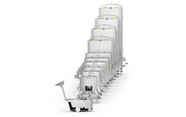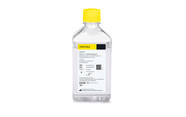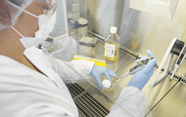Getting the Job (Done)
Sitting Down With… Will Downie, CEO of Vectura Group, UK

Why business and not science?
After graduating with a degree in biochemistry, I wasn’t sure if a life in the lab was for me. There were far better people around who were much more talented in terms of scientific prowess. I saw a job advert for a medical sales rep and thought, why not try that? I was living in Edinburgh at the time. I travelled to London and at the end of the interview, they asked if I had any questions. I naively and brazenly said, “Only one question to be honest. Have I got the job?” After all, I didn’t like the idea of traveling home 400 miles without knowing the answer! They sent me back into the reception area while they had a discussion, and ten minutes later they called me back in and offered me a job! I had the option to have territory in either the Highlands of Scotland or Essex. In my mind, the Highlands were cold and rainy, and I didn’t know anything about Essex, so I said Essex. I moved from Scotland to London – and I loved it.
What lessons did you learn early in your career?
There is an unwritten rule when you are a medical sales rep: you visit doctors in the morning and you won’t be able to see them at any other time. But nobody ever told me that so I would go see them in the afternoons and evenings – and it turned out that I saw more doctors than any of my competitor reps! I really enjoyed the job and I think it worked out because I didn’t have preconceptions and I didn’t set myself boundaries. I think that mindset is very important in any job. Don’t be limited by artificial boundaries. And if you work hard, good things will happen.
From medical sales rep to company CEO… Was it planned?
My career has never been planned! But my rules along the way have always been the same: work hard, try your best, be honest, treat people well, learn as much as you can, don’t be afraid of making mistakes and taking risks.
I’ve been very fortunate in that I’ve worked with great companies during my career – and many opportunities have come my way. Like the opportunity with Vectura. From the outside I saw a company with deep scientific expertise and a rich heritage in inhalation drug development that could unlock significant potential if it redirected its efforts into the CDMO industry. The CDMO market today is a very attractive space to be in, especially if you are a company with great technology, world-class innovation and excellent scientists. That’s exactly what Vectura is. I’ve been here eleven months now and I love it.
How did you find the transition to the CEO role?
Previously, I was part of Catalent’s executive team. I joined in 2009 and the company went through a huge transformation while I was there – and has been very successful. Catalent is now a very mature company and considered one of the top three players in the space. My role at Catalent was very commercially-focussed, whereas now I am working for a much smaller company in a more generalist role. When you make the transition to CEO, especially in a public company, you need to work with a much broader set of stakeholders, from investors, to shareholders, a board of directors and, of course, all employees in all functions. I must say, I am enjoying the diversity of the role and working with our great team.
I’ve had to go through a learning curve, but I’ve approached it with the same mindset I would bring to any new job: learn as much as you can as quickly as possible, and get close to the business to understand the details. From my perspective, it’s important to set out your stall, keep it simple, and communicate what the company is trying to achieve and why it’s so important.
And what about the challenges of being a new CEO when the pandemic started?
It felt like the switch for the pandemic was flipped overnight! We’d all heard about the emerging virus but the situation escalated rapidly. There was no playbook to refer to and we huddled together as a leadership team to establish our priorities for the business, with our most important focus being the safety and well-being of our employees. We quickly put in place the measures and operating rhythm we needed to keep the company safe, maintain our quality standards and look after the needs of our customers. People were thrown into situations that could be personally difficult. For example, people previously used to working in an office had to work from home – and many of them had children. You have to approach this in a sensible and sensitive way – and keep cool-headed, because people will panic if they see management panicking. Vectura is a relatively small company with around 400 employees and we can still speak directly to one another without going through layers of management. From the very beginning, we set up a coronavirus management team that helped us get organized. We kept very close to our teams across all sites and adopted a family-orientated approach to working through every challenge.
Of course, as well as considering our employees and how they were feeling, we had to consider our clients and their programs too. We had to reorganize our labs and implement new operational aspects to ensure employee safety. The pandemic is not going to end quickly, so everything we have done is about ensuring we are set up to support clients in a sustained way for the long-term.
What projects are you excited about?
Previously, the company was developing its own pipeline and working with quite a narrow corridor of clients in the respiratory area. Now that we’ve pivoted to becoming a CDMO, we’ve opened the aperture of the business and diversified our customers base – we’re developing products for a whole range of indications, including asthma, COPD, cystic fibrosis, pulmonary arterial hypertension, lung fibrosis, and COVID-19. Because we’re able to do both product and device development, we can consider the device requirements at the very beginning of preclinical product development. Inhalation drug development is very complex and challenging science but, if you do it well, you can have a big impact because there are many advantages in avoiding an injection, or avoiding the GI tract.
One project that I am particularly excited about is our work with Monash University in Melbourne, Australia. We are working on Oxytocin, which is a standard of care for women during pregnancy to avoid postpartum haemorrhage. In the developed world, women receive the standard of care via injection, but in the developing world it is challenging because the formulation requires cold chain supply and refrigeration, which is clearly a major challenge in hot climates. The number of women who die of postpartum haemorrhage is shocking in developing countries. We are working on the development of a dry powder inhaler version of oxytocin that will not require refrigeration, and may potentially have faster onset of action. It could have a profound impact on women in developing countries.
What is your top advice for other scientists who want to move into commercial roles?
It’s your career, so you have to take ownership and find a way to make things happen. Look for new opportunities to try out – ways to expand your experience, such as a secondment position, or a new project, or an entirely new role. And don't be afraid about the transition from science to the commercial world. If you have the right attitude, work hard, and treat people the way you expect to be treated, then good things tend to happen.
But you do need to find the right company too – one that has the right culture for you and people that you enjoy working with. If you don’t enjoy your job or don’t like the company, then go and do something else.
If you could have a conversation with anyone – alive or dead – who would it be?
I’d say Ian Curtis – the lead singer of Joy Division, in my opinion the best band in the world ever. Or Scottish footballer and manager Bill Shankly. He was a brilliant leader – very stoic and matter of fact. He’s well known for saying that football is not a matter of life and death, it’s much more important than that. I would love to ask him if he really meant what he said! He was such an inspirational character – very charismatic and creative. And he was an amazing leader who will go down in sport history as one of the best we will ever see.

Making great scientific magazines isn’t just about delivering knowledge and high quality content; it’s also about packaging these in the right words to ensure that someone is truly inspired by a topic. My passion is ensuring that our authors’ expertise is presented as a seamless and enjoyable reading experience, whether in print, in digital or on social media. I’ve spent fourteen years writing and editing features for scientific and manufacturing publications, and in making this content engaging and accessible without sacrificing its scientific integrity. There is nothing better than a magazine with great content that feels great to read.


















